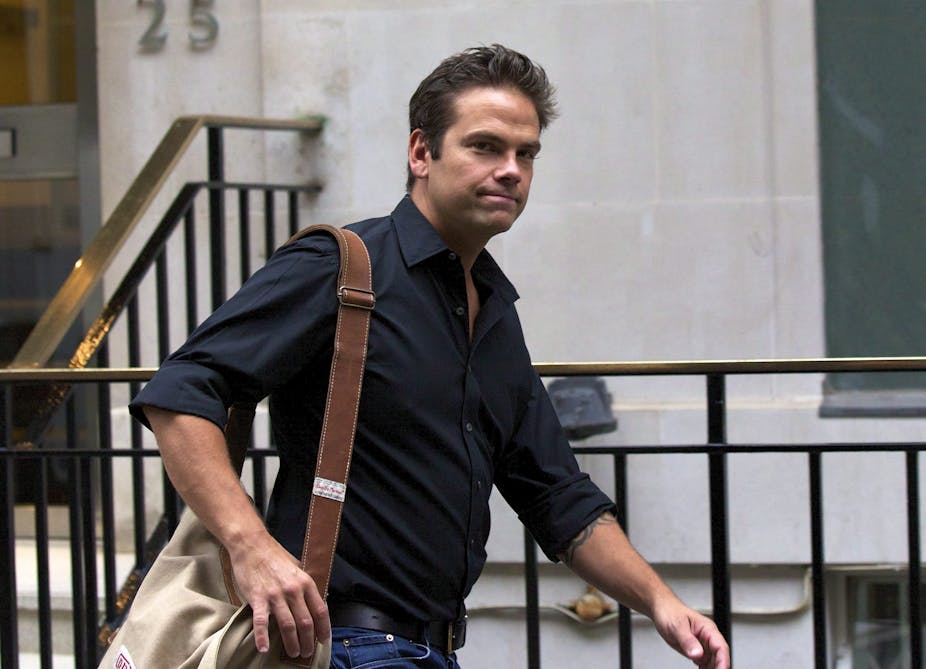The worldwide online activist group Avaaz, which claims over 14 million members and operations in 193 countries, has this week launched an Australian campaign against Lachlan Murdoch.
The group has written to the chair of the Australian Communication and Media Authority (ACMA), Chris Chapman, seeking an inquiry into Lachlan Murdoch’s links with News Limited, Channel 10 and radio networks DMG and Nova.
In an one-line email response to The Conversation, an ACMA spokesperson indicated that normal practice is not to comment on complaints.
According to Avaaz’s letter to ACMA, the group is alleging that Lachlan Murdoch could be in breach of the Broadcasting Services Act because he might be in a position of influence and control over three media companies that operate in the Sydney radio licence area.
The Broadcasting Services Act outlines a situation of “unacceptable three-way control”, where an individual is in a position to exercise control over a commercial radio licence, a newspaper and a television station in one metropolitan market.
The claim hinges on two factors: Lachlan Murdoch’s non-executive directorship of News Corporation (headquartered in the USA) and his family ties to father Rupert and brother James.
The Murodchs’ Australian operation, News Limited, is a wholly owned subsidiary of News Corp and Avaaz argues that Lachlan’s “strong associations” with his father – chairman and CEO of News Corp and chairman of News Limited in Australia – are enough to suggest he is in a position of influence and control over News Limited.
Lachlan is also on the board of Network Ten and has been chair of DMG radio since 2009. Avaaz further suggests that Lachlan’s association with the Murdoch family trust and the dual share structure of News Corp, which gives the Murdoch family effective control over the company, points to his ability to control what News Limited is doing in Australia.
Avaaz is relying on definitions of “associate” and “control” in the Broadcasting Services Act. An associate can be a person or a company that acts in concert with another person or company to exercise control over relevant media assets in the designated radio licence area. Control is also broadly defined to include control as a result of, or by means of, trusts, agreements, arrangements, understandings and practices, whether or not these have legal or equitable force and whether or not they based on legal or equitable rights.
However, in a statement released to the media, ACMA says that Lachlan Murdoch does not appear on the regulators schedule as a controller of News Limited assets in Australia. As such, he is not in breach of the cross-media ownership rules and there is no “unacceptable three-way control” situation.
When The Conversation sought clarification of this position, we were advised that the only statement ACMA would be making was a few lines issued the previous day via the Bloomberg news agency and published in the Sydney Morning Herald.
“The ACMA’s public register of controllers does not include [Lachlan Murdoch] as a controller of the News Corp/News Ltd newspapers. It naturally follows that we don’t regard him as a controller. He’s only listed there as controller of radio and TV assets.”
After numerous phone calls and emails, we are no closer to understanding whether ACMA intends to take this matter any further, or if the “complaint” from Avaaz has been dealt with by way of Wednesday’s brief media statement.
Attempts to contact a local Avaaz spokesperson have also come to nought.
The global chase
Avaaz has been chasing the Murdoch family around the world for the past year. The group stages media events in London when Rupert or his sons appear in public. In April last year, members of the group gathered outside the High Court to highlight the News of the World hacking scandal.
Then in July last year another colourful demonstration (that included activists with Rupert masks) was held outside Westminster.
Avaaz was back again last week when former News of the World editor Rebekah Brooks gave evidence before the Leveson inquiry.
In Australia, Avaaz has previously campaigned against Sky News getting the Australia Network channel contract, which the government eventually gave to the ABC under less than transparent circumstances.
Avaaz works through an online network and claims over 300,000 supporters in Australia. Alongside its colourful protest actions, Avaaz also campaigns through online petitions that it claims attract millions of respondents.
The group’s Australian targets also spread beyond the Murdoch clan. In February, Avaaz launched a petition opposing Gina Rinehart’s buy up of shares in the Fairfax Media group. However, it appears that the petition has not gained the 50,000 signatures the group was seeking before presenting it to Communications Minister Stephen Conroy.
Meanwhile, Ms Rinehart is keeping up the pressure on the Fairfax Media board to give her two directorships. So far the board has refused, though chairman Roger Corbett is reportedly doing the rounds to shore up his “non-intervention” pact with other directors.
In February this year, Avaaz launched a petition to the British broadcasting regulator Ofcom. The group describes News International as the “Murdoch mafia”.
Over 50,000 have so far signed the online form to support the petition.
Kiwi regulators to take a look at Sky too
Its also been reported this week that the New Zealand competition regulator is examining business deals involving local News Corp assets.
After giving a green light to join venture plans between TVNZ and Sky to launch Igloo, a low-cost pre-paid IPTV operation, the NZ Commerce Commission has signaled another investigation into Sky’s dealing with ISPs that may have competition implications.
Shares in Sky New Zealand apparently fell in response to this news and it seems that News Corporation and its local subsidiaries in several countries are now firmly in the cross-hairs of regulators, politicians and activists alike.
All this attention must make it uncomfortable for Rupert and his children when they have discussions with other board members, or field questions from shareholders.

